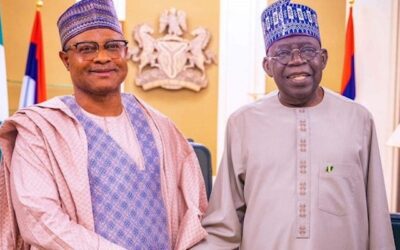PDP, SERAP and the Twitter Matter: A Show of Irresponsible Opposition
The current entanglement surrounding the suspension of a popular online platform, Twitter, seemed to have revealed what opposition politics in Nigeria is all about. It is rather regrettable that the well-being of citizens does not matter to most opponents of the government. Almost everything is about personalities and self-aggrandisement.
The country’s brand of opposition politics now dwells on inconsequential matters that can barely engender sustainable debate.
How can one explain the quality of recent responses and mindset from an opposition that portrays either a total lack of coordination or inability to articulate issues of national importance to which people can rally around?
From the main opposition party to non-governmental bodies like SERAP and other similar organiszations, the output is frivolous knee-jerk reactions that cannot be supported by any form of logical reasoning.?
Immediately the ban on Twitter was announced, it did not matter to those rabidly opposed to the government of the day if the corporate existence of Nigeria was in any way at the stake. The main opposition party, The Peoples Democratic Party, in its rant through its National Publicity Secretary, Kola Ologbondiyan, claimed that the party is worried that government could exhibit “such primitive intolerance and power intoxication because the social media giant demonstrated international best practices in not allowing the Buhari presidency to use Twitter as a platform to propagate and spread the Buhari administration’s hatred towards Nigerians.”
The party screamed its rejection of what they called the “unwarranted suspension” of the social media platform , by the President Muhammadu Buhari-led federal government, describing it as “a draconian action and a slide towards a fascist regime in our country.”
It never occurred to the party that if Twitter had demonstrated “the international best practices” it claimed the platform followed, there would not have been any need for the same Twitter to delete series of hate posts made by the leader of the banned Indigenous People of Biafra (IPOB), Nnamdi Kanu, after the hammer landed on the online platform.
Rising from one stupor to another, the PDP spokesman averred, “Furthermore, our party has commenced the compilation of a list of APC leaders, involved in the infringing on the rights of Nigerians for onward transmission to the UN and other world bodies for sanctions.”
In one breath,e the party was calling for sanctions from the United Nations, and in another breath, at another turn they want the United States, United Kingdom, Canada, Saudi Arabia, and other members of the international community to immediately ” impose visa ban on President Muhammadu Buhari and members of his cabinet involved in the recent suspension of the microblogging site, Twitter, in the country.”.
Read Also: Twitter Suspension: Confrontation Rises to its Crescendo
From one spurious claim to another, the PDP spokesman, Kola Ologbondiyan, declared that banning Twitter in Nigeria “is a clear violation of Article 19 of the UN Charter as well as section 39 of the 1999 Constitution (as amended), which guaranteed freedom of expression to all Nigerians.”
In this light the country and its government must be sanctioned. It did not bother the party that there is no antecedent of any country in the world sanctioned for regulating her media space against dissentient elements.
It was a performance that many lovers of comedy struggled to appreciate the nuisance value Ologbodiyan served. It was quite unfortunate that the party’s caucus in the National Assembly was misled into staging a work-out from on the floor of the house in favour of a company that declared that they are not aware of the existence of Nigeria and her leader. The whole performance sent commentators on international politics muffling with laughter. The shame undoubtedly would be on brand Nigeria.
The PDP had some “worthy” partners in some non-governmental groups like the Socio-Economic Rights and Accountability Project (SERAP). The body also condemned the “illegal and unconstitutional suspension of Twitter’s operations in Nigeria,” and called on “the government of President Buhari to immediately rescind the suspension within 48 hours or face legal action.”
While the senior partner targeted the UN, America, and others in its comedy of errors, SERAP’s performance was for a near-moribund international organisation, The Commonwealth of Nations. The body claimed that it has sent an urgent appeal to the Secretary-General of the Commonwealth, Rt. Hon Patricia Scotland QC, urging her to “apply the Commonwealth Charter to hold the Nigerian government to account over the unlawful suspension of Twitter in Nigeria, and the resulting repression of human rights particularly the rights to freedom of expression, access to information and media freedom, as well as a flagrant disregard for the rule of law.”
The organisation wants Scotland to “urgently consider recommending the suspension of Nigeria from the Commonwealth to the Heads of Government, the Commonwealth Chair-in-office, and Her Majesty Queen Elizabeth II, as Head of the Commonwealth to push the government to take concrete measures to respect and promote the Commonwealth’s values of human rights, transparency, accountability and the rule of law.”
While it is normal for the opposition to hold the government accountable, and disagree with it on policy direction, governance, and welfare, as well as other key issues, it is ridiculously annoying when decorum, decency, and believability are discarded just to score cheap political points.
Just like Nigerians have condemned so many mediocre governments in the past, and any mediocre opposition should equally be rebuked, clearly if our democracy must grow to maturity.
It seems PDP and other opposition elements have not learned that they need to consult, organise and plan strategically on how to articulate their positions on issues if they want to win back the hearts of Nigerians. Condemning every step of the ruling party is not constructive and cannot serve the PDP’s interest. What will stand it in good stead is to task the government on good governance and take it up on policies that they clearly see are unwholesome. These must be policies that can make fundamental impacts on the lives of the people.
Politicians should note that playing politics from the opposition platform is honourable, as they exist in the possibility of a peaceful handover of political power among elites whenever voters decide. Opposition parties are therefore sites for counter-elites to form and campaign as potential alternative governments. Another role of the opposition is to legitimise the democratic political order. There can’t be democracy without the existence of an alternative.
Knowing that everyone survives because the system is in place, the concept of “Loyal Opposition” presently rules the democratic world. This presupposes an opposition that is loyal to the democratic order, not necessarily the government of the day.
It is a concept that dates back to 1826 that has always guided debates in the British parliament. This means members of Parliament may oppose the policies of the incumbent government while maintaining deference to the authority of the state and the larger framework within which democracy operates.
Even in the US, the concept of ‘Loyal opposition’ comes alive in a different form. As tributes poured in for respected politician and statesman, Senator John McCain, after his death some months ago, .
One of the archival materials that resonated along this line was when he (McCain) reprimanded one of his supporters who called Barack Obama, his opponent, names and doubted his identity.
In a widely circulated video recorded at a McCain rally in 2008, a woman, in an extreme show of loyalty to McCain’s cause, probably to impress the candidate, went overboard when she said: “I can’t trust Obama. I have read about him, and he is an Arab”.
Faced with the temptation to endorse this and rally a largely white electorate to his side, McCain rather retorted: “No ma’am., Obama is a decent family man, a citizen that I just happen to have disagreements with on fundamental issues, and that is what this campaign is all about.”. Defending Obama elsewhere in that hate-filled 2008 presidential contest, over race and religion, McCain said “He, Obama, is a decent person that you do not have to be scared of… I admire Senator Obama and his accomplishments. I will respect him. I want everyone to be respectful, and let’s make sure we are. Because that’s the way politics should be conducted in America.”.
That is the spirit that opposing politicians everywhere, including Nigeria, should imbibe. Democracy in Nigeria will develop if the opposition appropriately appreciates its role and adequately carries out the same with the expected altruistic motives.
This is an area that has to be given a more pragmatic consideration in Nigeria. Opposition must not be for opposition’s sake and it must be devoid of repulsive languages and must be within the globally accepted standard or best practice.
Those in opposition should understand that people in government are not angels; they are human and indeed Nigerians. They are liable to make mistakes, and in the same way as the party in opposition. The only duty an opposition party need is to provide an alternative view and this must be properly dissected, articulated with civility, and effectively communicated to the general public.
All politicians must note that at any point in time there can only be one driver in a car and whichever party the electorate chooses as the government at any point, it has a responsibility to discharge that mandate effectively and efficiently. At that point, the party that is not in government also has a role to play to show the electorates that it is better positioned to provide leadership and thus, must provide alternative reasoning on all issues with maturity.


